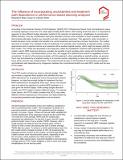Research Brief: The Influence of Incorporating Uncertainties and Treatment Path Dependence in Performance-based Planning Analyses
Author(s)
Guo, Fengdi; Gregory, Jeregmy; Kirchain, Randolph
DownloadVol82018_ResearchBrief_AssetManagement.pdf (69.06Kb)
Metadata
Show full item recordAbstract
According to the American Society of Civil Engineers (ASCE) 2017 Infrastructure Report Card, the backlog for repair of existing highways across the U.S. totals approximately $420 million. With funding at all-time lows, it is important that agencies select maintenance, rehabilitation & reconstruction (MRR) activities through use of efficient budget allocation models. One key consideration during the allocation process is the evaluation of each available treatment. At present, most budget allocation models use a benefit-cost ratio to evaluate treatments. This approach, while convenient, is limited in current implementations because they only consider the benefits of a current treatment and assume a known, fixed future. For example, when evaluating an asphalt overlay such an approach assumes this is always followed with another asphalt overlay. The CSHub has developed a new approach called the probabilistic treatment path dependence (PTPD) model in which MRR treatment decisions consider benefits of each possible current action, the likelihood of future conditions (e.g., road deterioration, prices, etc), and the optimal future actions to take given an uncertain future. With this approach, when evaluating an asphalt overlay, we assume that it may be followed by an asphalt overlay or a concrete overlay depending on future prices and the rate of deterioration. This research brief focuses on the benefits of incorporating uncertainties and treatment path dependence by comparison between the conventional benefit cost ratio (B/C) model and the new PTPD model.
Date issued
2018-11Series/Report no.
MIT CSHub Research Brief; Volume 2019, Issue 8
Keywords
Network Asset Management, Performance-based Planning, Life Cycle Cost Analysis, Infrastructure